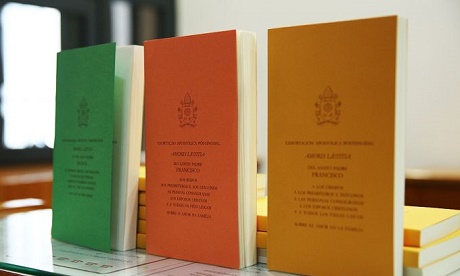The Vatican is striking back at critics of Pope Francis’s document on family life, titled “Amoris Laetitia (The Joy of Love)”.
Wednesday’s L’Osservatore Romano carried a front page essay by Italian Catholic historian and politician Rocco Buttiglione.
He insisted that the document is in line with teaching by previous popes on divorced and civilly remarried Catholics receiving Communion.
Amoris Laetitia has been interpreted by some as Francis giving a cautious opening on the issue.
Using strategically placed footnotes, the document seemed to suggest that bishops and priests could open a door on a case-by-case basis after accompanying people on a spiritual journey of discernment.
Buttiglione said the Church has always taught that there can be cases in which the faithful might not believe themselves to be in a state of mortal sin or might not be fully responsible for it, which can mitigate their culpability.
“The path that the pope proposes to divorced and remarried is exactly the same that the Church proposes to all sinners: Go to confession, and your confessor, after evaluating all the circumstances, will decide whether to absolve you and admit you to the Eucharist or not,” he wrote.
Earlier this month, the Vatican-approved magazine La Civilta Cattolica ran an interview with Cardinal Christoph Schoenborn in which the Vienna archbishop pointedly rejected claims that Francis’s work didn’t count as an authoritative teaching document.
The document, Cardinal Schoenborn said, “is an act of the magisterium that makes the teaching of the Church present and relevant today”.
In May, German Cardinal Gerhard Mueller said decisions about whether someone can receive the sacraments cannot be arrived at purely in the realm of individual, private discernment.
“A privatisation of the sacramental economy would certainly not be Catholic,” he said in a speech in Spain.
Cardinal Mueller is the prefect of the Congregation for the Doctrine of the Faith.
Sources
